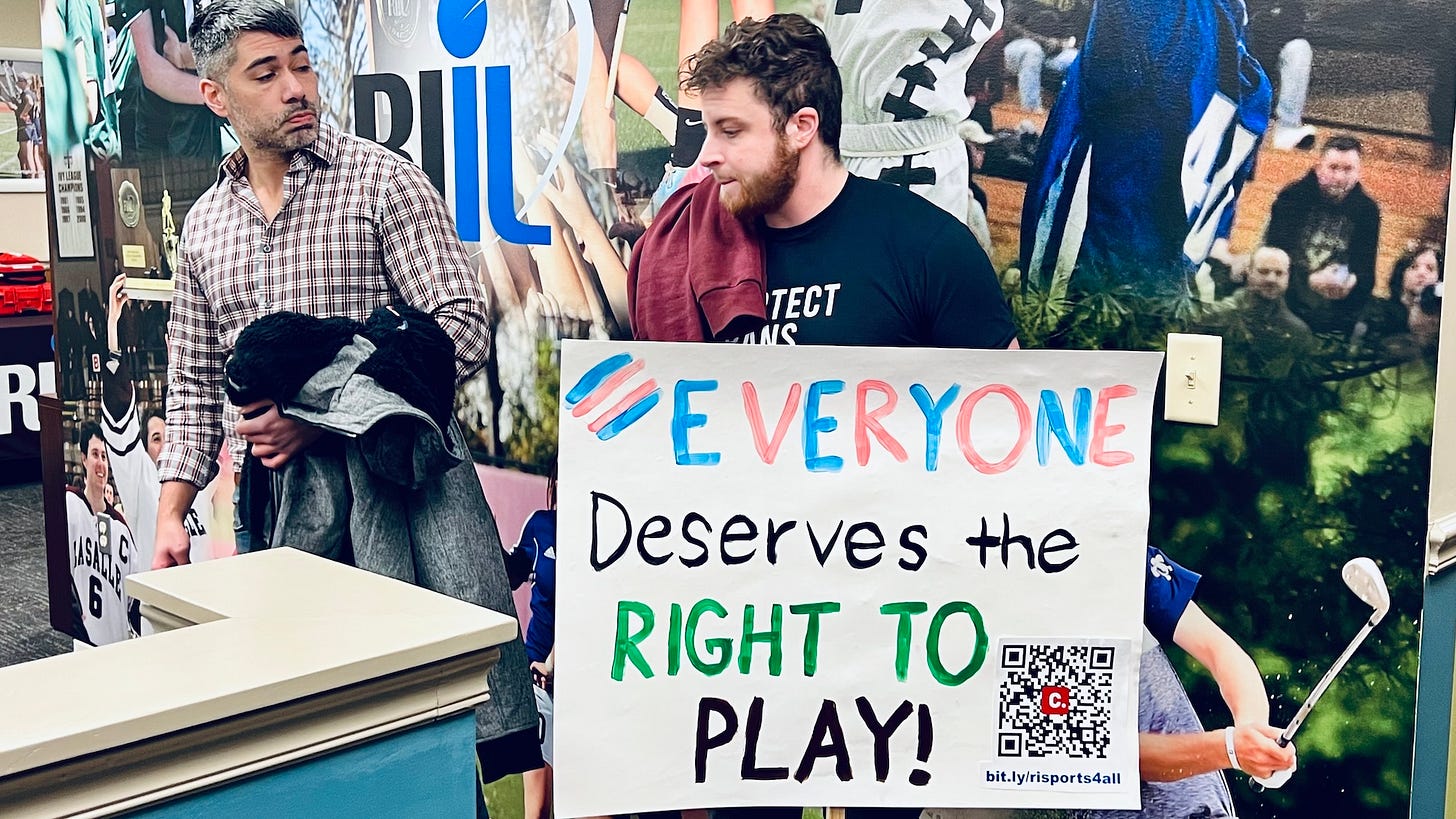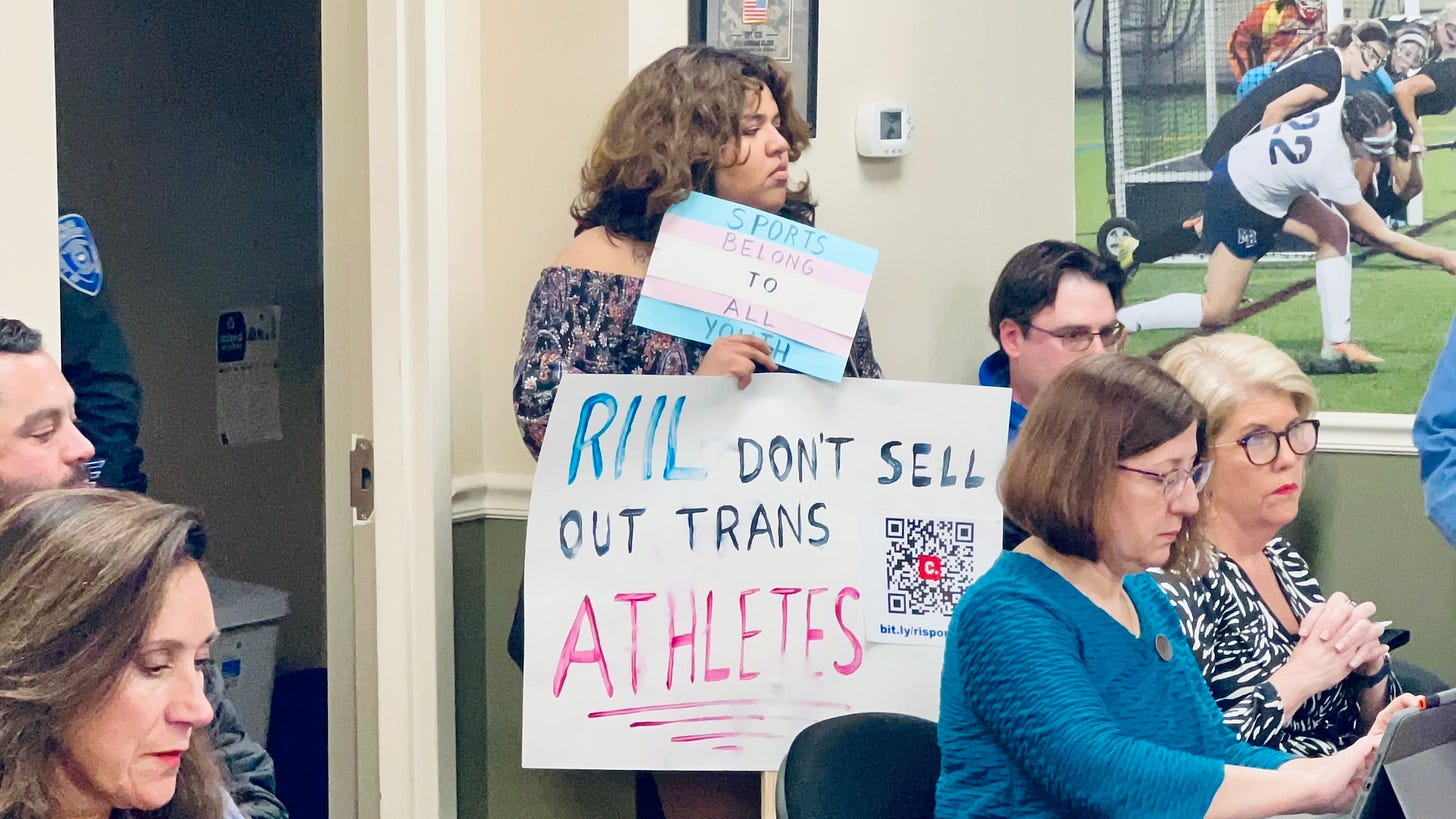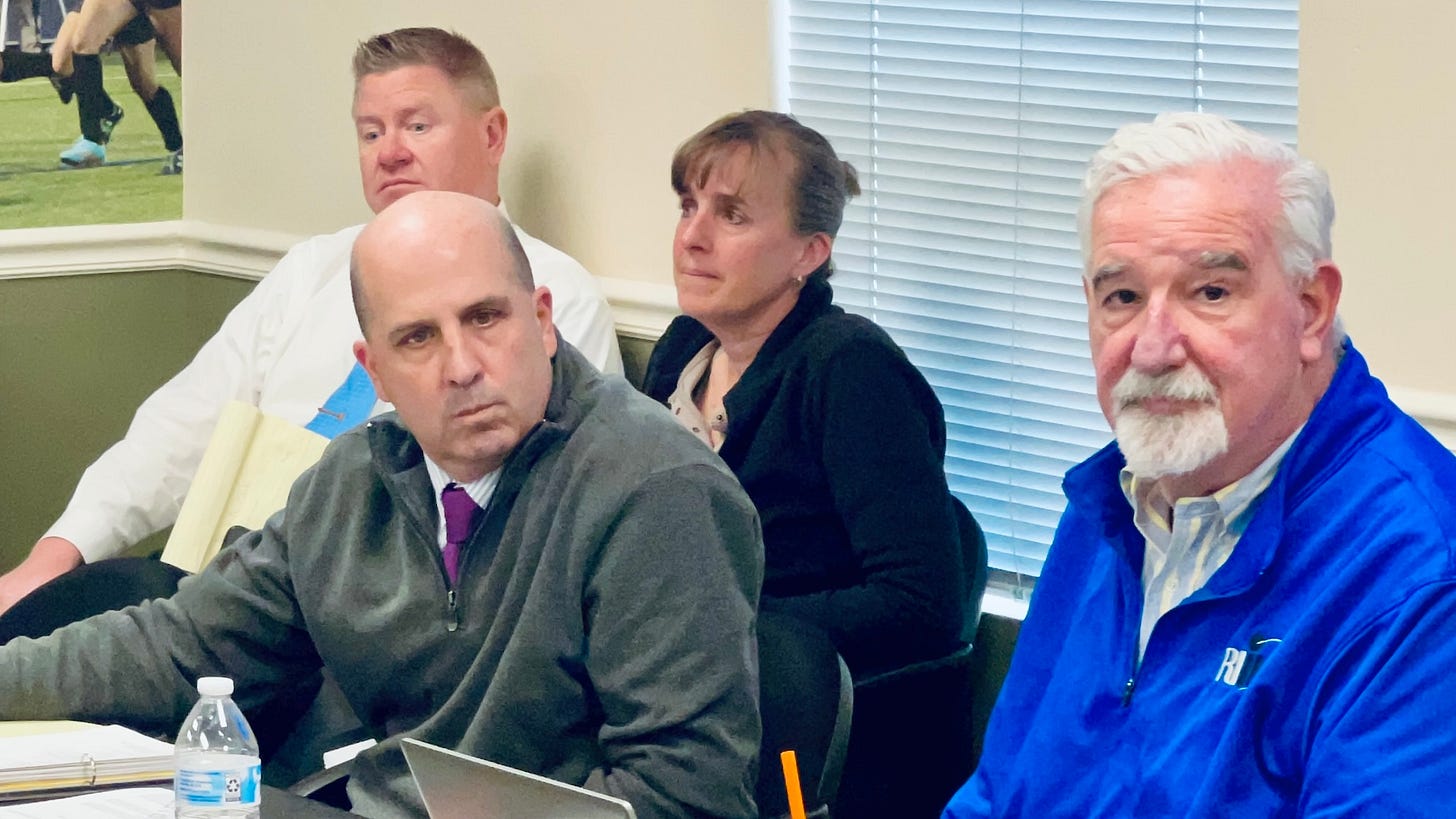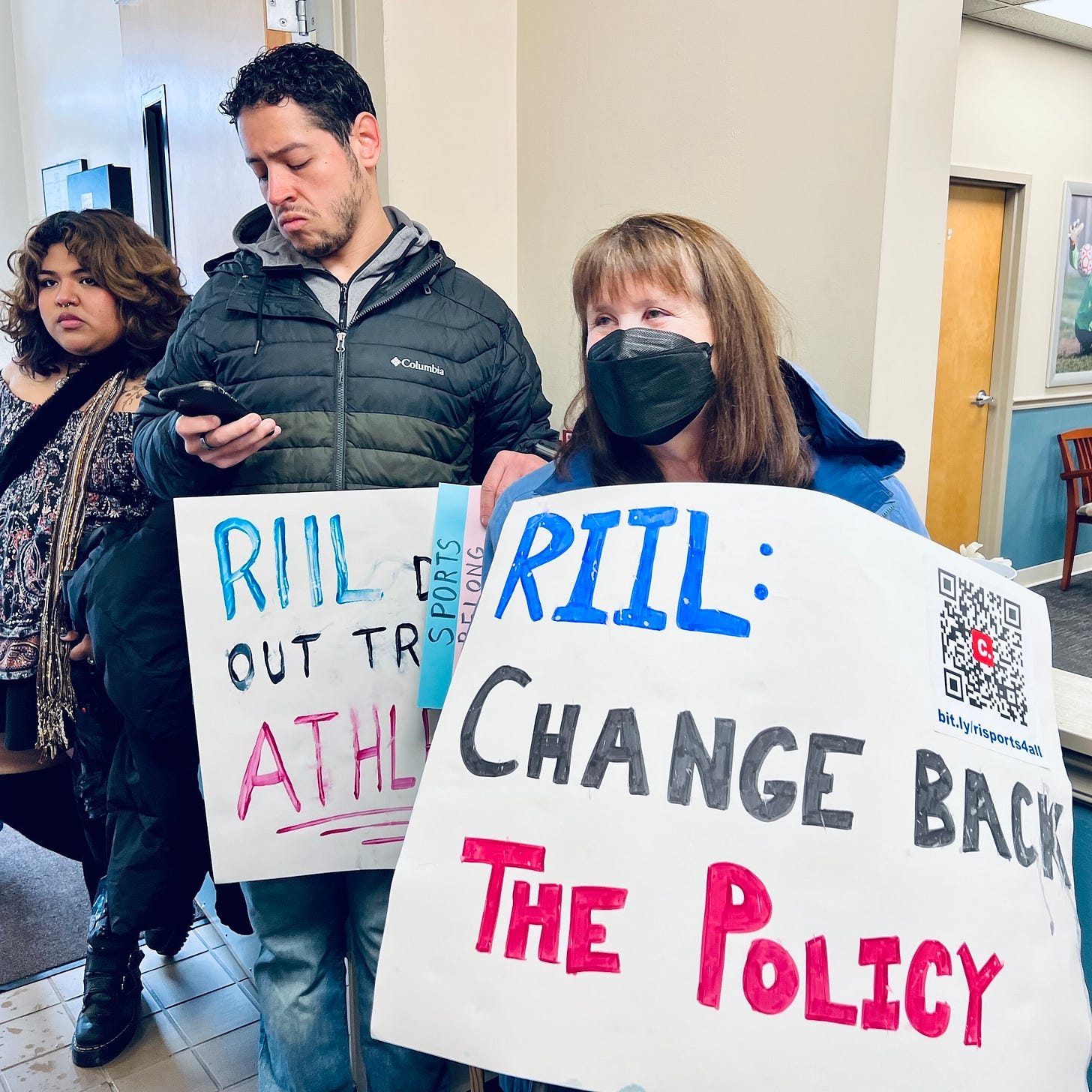The RI Interscholastic League refuses to answer basic questions about changes to its transgender student-athlete policy
Steve Ahlquist: What is the venue for discussing RIIL policy? RIIL Chair Warner: Certainly it’s not here, and it’s not now. Steve Ahlquist: Not at RIIL?
The Rhode Island Interscholastic League (RIIL) met on Monday, and even before the meeting started, they were clear with the 15 or so people who showed up: The RIIL’s policy on transgender, gender diverse, and transitioning student athletes was not on the agenda and would not be discussed. People could attend, but the RIIL did not take public comments.
The policy that brought all but one of the public to the usually sleepy meeting was changed on March 7. Previously, the policy would allow a student athlete to play on a team that accords with their gender. I wrote about what was known about the change in policy here. The new policy leaves that decision to individual principals and athletic directors. Before March 7, there was one statewide policy. Now, each public high school could have a different policy. State law and RIDE guidance have not changed, and the executive orders from President Donald Trump do not have the force of law, but the RIIL changed their policy anyway, perhaps in reaction to a complaint brought by some anti-trans hate groups.
Normally, the RIIL meetings are quiet affairs, with maybe one person from the public in attendance. On Monday, perhaps sensing the public response, the RIIL had a member of the Warwick Police Department on hand.
Advocates filled the room, silently holding signs in support of transgender student-athletes while the RIIL board discussed changes to its golf policies. With no opportunity to be heard under the rules, the only option was civil disobedience. Teachers Paul Pasaba and Syed Menebhi began to address the board. The police officer moved towards them to evict them from the room, but Executive Director Michael Lunney motioned to the officer to let them speak:
Paul Pasaba: We’re representing more than 500 people who signed our petition, demanding that the RIIL roll back the decision that was made earlier this month to delete the old policy that said that all students should have the opportunity to participate in RIIL activities in a manner that’s consistent with their gender identity, irrespective of the gender listed on the student records. Previously, the league stood up in defense of transgender youth inclusion. Your new policy puts the onus on principals and athletic directors to make decisions about individual students’ participation in sports. For years, we’d had trans youth participating in sports in Rhode Island without issue. This policy change will lead to the exclusion of transgender and gender nonconforming youth in a league where they previously felt protected.
Syed Menebhi: The motivation for this change came from threats made by a small group of radical activists who would rather attack youth sports than keep them open for everyone. You may argue that this policy is simply a correction to an earlier overreach. Your primary responsibility is to make the benefits and opportunities of youth sports available to all kids in Rhode Island. That’s why this organization exists.
As a voluntary, private, nonprofit association, not funded by state or federal government, you are in a unique position to do what’s right here. You’re under less jurisdiction of an executive order than many of your member schools. As a private association, you establish the rules and regulations for participation. The policy that you had just weeks ago is the right one. The old policy accords with RIDE guidance that calls schools to be safe and free from discrimination for all students regardless of sex, sexual orientation, gender identity, or gender expression. The old policy lives up to the first governing values listed on your website - equity, fairness, and justice.
Paul Pasaba: Over my years as an educator, I’ve gone to games where my students have been playing, including one of my transgender students. Listening to the players, listening to the crowd. I hear cheers of support. I hear athletes pumping each other up. I hear cries of joy or disappointment at points scored or missed. I hear the occasional disagreement with a ref’s call. What I don’t hear is people despairing over the so-called gender crisis in youth sports. As one of our petitioners, Meredith from Gloucester asked, “Who matters more to RIIL, hate groups or kids here in Rhode Island?” There are very few transgender athletes, as a reminder, competing anywhere. This is an issue cooked up to divide and distract Americans.
Syed Menebhi: One of the petition signers, Alexi from Scituate, communicated how youth sports affected their life: “I, now 30, and still trans, was a trans kids in high school, and if I’d been banned from running, I probably would’ve lost the love I still have for running. Running is one of the best things in my life, and to take that away from children because of who they are, is incredibly terrible to their wellbeing.”
Research shows that trans youth are at a higher risk of depression, homelessness, and suicide than their cisgender peers. Those of us who work with LGBTQ young people are worried about these trends worsening now that trans people are being targeted by lawmakers all over the country. Sports offer these youth the joy and comradery that they deserve. Joy and comradery that can literally be lifesaving. Right now, there are student athletes in our school system, just like Alexi, depending on you to make the right decision here. The hate groups issuing legal threats to RIIL would rather jeopardize youth sports than make them available to all young people. Don’t bow down to these bullies. Don’t sacrifice the civil rights of trans kids in order to appease [hate groups]. Thank you for your time.
Paul Pasaba: We got the petition signatures of over 500 people collected in just five days. It’s 500 people and growing, demanding that you revert back to the original wording of your policy, which explicitly stated, per RIDE guidance, that youth may participate in sports consistent with their gender identity. We collected these again in over five days, so this is a growing movement. We’ve got the support of several members of the General Assembly, including several elected officials, and the Rhode Island Department of Education.
We’ll continue to grow this effort until you reinstate the old policy and make Rhode Island sports an inclusive space for all student athletes. Please respond to this demand by contacting Syed or me by March 31st, which, in case you didn’t know, is Transgender Day of Visibility. Let us know how you plan to move forward.
After the teachers spoke, anti-trans activist and Christian Nationalist Robert Chiaradio demanded “equal time.” There were at least 15 other attendees in the room, supporters of transgender student-athletes, who wanted to speak, but they were not given “equal time.”
Attendee: If we’re talking about safety, I want to say that as the parent of a 13-year-old daughter who is an excellent athlete and happens to be transgender, I would feel extremely unsafe knowing that you and your unbridled interest in her genitalia would have anything to do with her.
Robert Chiaradio: I’m not interested in her genitalia.
RIIL Chair Daniel Warner: Hold on, everybody. This is not the venue for this type of discussion. There certainly are other venues, and I would strongly encourage everyone to pursue those.
Steve Ahlquist: What is the venue for addressing the RIIL policy change?
Chair Warner: This is not the venue for that.
Steve Ahlquist: What is the venue for discussing RIIL policy?
Chair Warner: Certainly it’s not here, and it’s not now.
Steve Ahlquist: Not at RIIL?
Syed Menebhi: Where is it? This policy change was made in an email to administrators and athletic directors with very little communication. I don’t know how many transgender people you have on your committee. I dunno how many queer people you have on your committee. I dunno how many people of color you have on your committee. But this decision was made and communicated via email without any voice from the public or those representing the identities it impacts.
Chair Warner: Thank you. Again, we’re going to move through our agenda. I appreciate everyone coming and those who spoke. Certainly, everyone has an opinion.
Attendee 2: When will we be able to speak?
Chair Warner: ...but we’re going to continue our agenda, and that’s all I have to say. Thank you.
Paul Pasaba: We trust you’ll let us know when and where the venue is, where we can address this. A lot of people need to be heard, not just us. We’re representing a lot of people out there.
Chair Warner: And so we post our agendas...
RIIL Lawyer (quietly, to the Chair): This goes in a press release. It’s not on the agenda today, so they can use other means to find out how that process works. It’s not for today.
Chair Warner: I would call the office to see if it could be or will be a future agenda item...
Steve Ahlquist: I called the office and got no response.
Attendee 3: Who makes the agenda?
Chair Warner: So again, I would call the office and see about that process in getting...
Attendee: Do you want all of us to call in your office, or do you want to make a decision and say something like, “We will work to find a place to have this discussion?”
Chair Warner: This is not the place for this...
Attendee 3: I know that, but you don’t seem to want to give us a place.
Chair Warner: I don’t have the answer that you’re looking for.
Attendde 3: Who does?
Attendee 4: Who is empowered to make this decision?
Chair Warner: Again, this is not the place to have this discussion.
Steve Ahlquist: That’s the silly thing to say.
Chair Warner: We have an agenda that we need to follow, and we’re going to follow that agenda. I appreciate people’s comments and everyone coming today. You’re welcome to be here, but it’s not part of our agenda today.
Attendee or Board Member: We’re talking about golf.
Seyd: Some transgender students are being isolated from some of the only camaraderie they have.
Attendee 5: Right. We don’t want to be here to tell you how to play golf. I mean, I think that’s important. I think it’s cool. But right now, it feels far more important to you than some student athletes in this state. And that is sad because you won’t give us any hope of a chance to have this discussion.
Chair Warner: That’s an unfair assumption.
Attendee 5: Why?
Chair Warner: We have an agenda that we’re going to follow. I know this is certainly an important topic, and it deserves to be on a future agenda.
Attendee 5: Thank you.
Chair Warner: It’s not on today’s agenda.
Attendee 5: I know.
Attendee 6: Can you share the agenda-making process with us so we can encourage the person who makes the agenda to include this?
Chair Warner: So my first suggestion - go through your high school principal. They’re the ones that come to us with topics that need to be discussed here at the principal’s committee on athletics. So that would be my first step for anyone here.
Attendee: Does it just require one to speak up?
Chair Warner: Sure.
Attendee 2: How is today’s agenda created? Just as a point of reference?
Chair Warner: Again, we get information from our principal’s groups around the state and put on those topics that are brought to our attention. There’s nothing that we disallow or allow; it’s just an ongoing process.
Attendee 2: Is it time sensitive, like this one...
Chair Warner: We do need to move on.
Steve Ahlquist: When did the RIIL decide, and was it in an open meeting like this?
Chair Warner: Call your principals and ask that this become an agenda topic. We’ll continue with today’s meeting. Again, thank you for coming, and you’re welcome.
I spoke to the teachers, Seyd Menebhi and Paul Pasabe, in the hall outside the meeting room.
Syed Menebhi: We’re here today because we believe in the equity of sports in Rhode Island. We also support transgender youth being able to play on a team that is consistent with their gender identity, just like the Rhode Island Department of Education.
Paul Pasaba: RIIL’s old policy said that youth could participate as their true gender regardless of what is listed in their records. They explicitly stated that there was no need to change that policy. It was a good policy that included everyone. They should change it back.
We presented a petition with over 500 signatures collected in the last five days.
Syed Menebhi: Many people support this movement and want to support all youth in Rhode Island, so it wasn’t that difficult to collect these signatures. This movement will continue until we achieve that goal.
Reporter: You were not on the agenda and spoke up during the meeting over the chair’s objections.
Syed Menebhi: They said meetings are open to the public, but they didn’t have an opportunity to comment publicly at the meeting.
Paul Pasaba: Sure. If there were a clear process for raising this conversation that many people out there care about, we would’ve done it the “right” way. But the problem is there isn’t a clear way to do it. We could see on their website that this meeting is scheduled for today. The next meeting was scheduled for June, and we couldn’t get access to the previous minutes to find out how this decision was made. As far as we can tell, the decision was emailed to the participating principals - and everyone was blindsided. We don’t think they’ve gotten enough public input on this.
One of the committee members came out to meet us because there was a crowd developing here to tell us what was going on and told us, “We’ve got a packed agenda.” We said, “We’d like five minutes to address the committee. There’s a lot of public interest here; can we get five minutes?” And he told us flat out, “No, that’s impossible.” When we entered the meeting room, they said, “You’re welcome to be here, but we are not going to talk about anything that’s not on the agenda.” So there wasn’t a space to represent those here who wanted to stand up for trans athletes.
Syed Menebhi: We gave them the petition and said we’d like to hear back from them about either putting this item on future agendas or with some sort of plan for how they will move forward. We will keep developing a network of people and stay in this fight. This isn’t the only fight happening right now—transgender youth are being victimized all over the country by lawmakers. But we live in Rhode Island, and it’s our goal to make our communities as equitable as possible.
Paul Pasaba: The old policy was good. It got changed quickly, in the dark, because of legal threats from Rhode Island hate groups. If they change it back to the old policy that included everyone, that would be good. RIIL is in a unique position here. They are a private association, so they’re not subject to the same rules in terms of executive orders. They’re not under the same sort of threat as other schools are. They’re uniquely positioned to do the right thing and stand up for all youth athletes.
After the protesters left, I sat in for the remainder of the meeting. The board then voted to go into executive session. I left the room and waited just outside so I might have a chance to speak to RIIL’s Executive Director Michael Lunney. I had many questions, but my email and my phone calls had gone unanswered since last week. Under the Open Meetings Act (OMA), when an Executive Session ends, the meeting is reconvened publicly, and any votes taken while in committee are publicly stated. To my surprise, I was locked out of the offices, a minor but real violation of the OMA. Through the police officer, I passed a message to Michael Lunney, saying that I wished to speak with him. After a few minutes, Executive Director Lunney and RIIL Chair Daniel Warner met me outside the office.
Steve Ahlquist: I was trying to call you to discuss the transgender student issue before this meeting last week. When I called, they said you weren’t in and gave me the real info email. I haven’t received a comment, so I hope to talk to you about that.
RIIL Executive Director Michael Lunney: Well, so we’re going to be releasing a statement on this, so we’re not going to be commenting beyond that.
Steve Ahlquist: My questions were mostly about background. When was this decision made? How was the decision made? Was it on a public agenda? Was there a public engagement? All that stuff. Do you have anything you can say on that?
RIIL Chair Daniel Warner: It’ll be part of the release we send everybody.
Steve Ahlquist: Okay. Lastly, what is the future of this? The next meeting is two months away, the spring season has already started, and I’ve already heard from one parent who’s concerned that their child won’t be able to participate. This could really hurt kids.
Chair Warner: We have a process that we need to follow...
Steve Ahlquist: What the process was to get here is what I am asking...
Chair Warner: The process we’ve been following for a long time, but we’ll put it all in a release.
Executive Director Lunney: I appreciate you coming out. I think there are a lot of misconceptions out there right now that we need to address.
Steve Ahlquist: Yeah. Okay. When is this release coming out? And it will explain everything?
Executive Director Lunney: Probably by tomorrow... A lot is swirling around this whole thing from the legal side.
Steve Ahlquist: I look forward to hearing your explanation...
After I received the “press release,” I wrote back to Executive Director Lunney, saying, “This statement is in no sense what I was promised. It is woefully and insultingly incomplete.”
Here it is:










It's so deeply disgusting to read about all of these "rule followers" who really only care about rules when they offer an avenue to harm people they don't personally care about.
They are so good at blocking… and lying. So often lead by fear rather than principles. Sigh. Thanks for fighting the good fight and for all those making good trouble!!